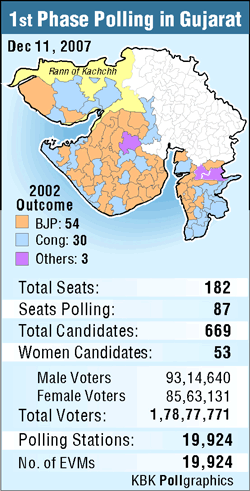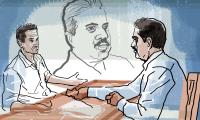 Polling for the first phase of the crucial assembly polls in Gujarat for 87 seats in the 182-member house will be held on Tuesday in the midst of sharp exchange of words between the Congress and the ruling Bharatiya Janata Party.
Polling for the first phase of the crucial assembly polls in Gujarat for 87 seats in the 182-member house will be held on Tuesday in the midst of sharp exchange of words between the Congress and the ruling Bharatiya Janata Party.
Around 1,78,77,771 voters (93,14,640 males and 85,63,131 females) will decide the fate of 669 candidates including 53 women contesting for the seats in South Gujarat and Saurashtra and Kutch regions. Tight security arrangements have been made by the Election Commission to prevent any untoward incident.
The second phase of polling for the remaining seats will held on December 16 while the counting for votes will take place on December 23.
The stakes are quiet high as this election will be a make or break situation for Chief Minister Narendra Modi who has taken up the task to get his party back to power on his personal image.
The Congress, in turn, has campaigned against Modi in a very aggressive manner, along with Gujarat BJP rebels, eight of whom later joined the opposition and are contesting on its tickets.
Congress has tried to accommodate all the other small parties by sharing the seats with them. However, the Bahujan Samaj Party of Uttar Pradesh Chief Minister Mayawati is fighting on its own.
Voting in Saurashtra and Kutch, which have the highest number of 58 seats among other regions, will have a major say on who will be forming the government in Gujarat, observe analysts. The region is a home to rebel BJP leader Keshubhai Patel.
The BJP had won 39 seats here in 2002 while the Congress has won 18 and one seat had gone to an independent candidate. Counting of votes for the two-phased polls will take place on December 23.
The BJP had won 39 seats here in 2002 while the Congress has won 18 and one seat had gone to an independent candidate. In South Gujarat where the contest is for 29 seats, both BJP and the Congress are going neck and neck. Here also strong BJP rebel leader Kashiram Rana is likely to cause major damage to the BJP.
The BJP had won 16 seats in the region in 2002 while Congress had got 11 seats and two seats went to Janata Dal (United).
The election will decide the fate of 10 ministers of Narendra Modi government, including his number two Vajubhai Vala, who is contesting from Rajkot II constituency.
The BJP has fielded candidates for all the 87 constituencies while the Congress is fighting in 82 seats. The BSP has put up 78 candidates, NCP four, Communist Party of India one and CPI-M one. There are 416 independents and others in fray.
The Election Commission has set up 19,924 polling stations for voting. The number of electronic voting machines that will be used are also 19,924.
While the largest assembly constituency area wise is Abdasa, largest constituency in terms of the size of the electorate is Chorasi (15,93,907 voters). The smallest constituency electorate wise is Manavadar (1,25,902 voters).
All constituencies will be witnessing a straight fight between the ruling BJP and opposition Congress.
Porbandar has the higest number of 15 candidates while Keshod, Mahuva and Gandevi have three candidates each, which happens to be the lowest.







